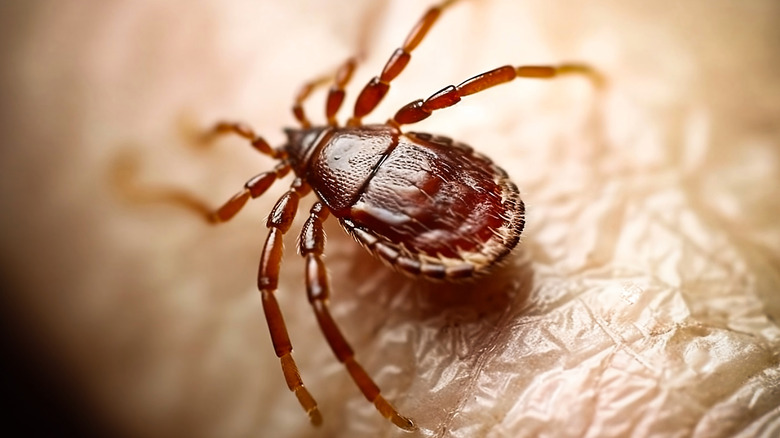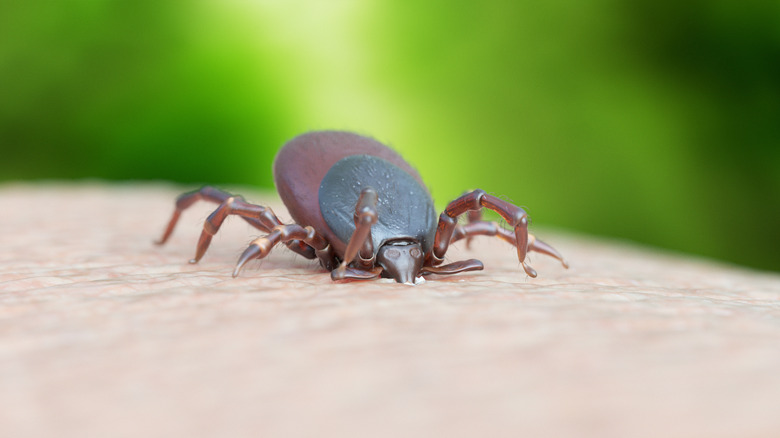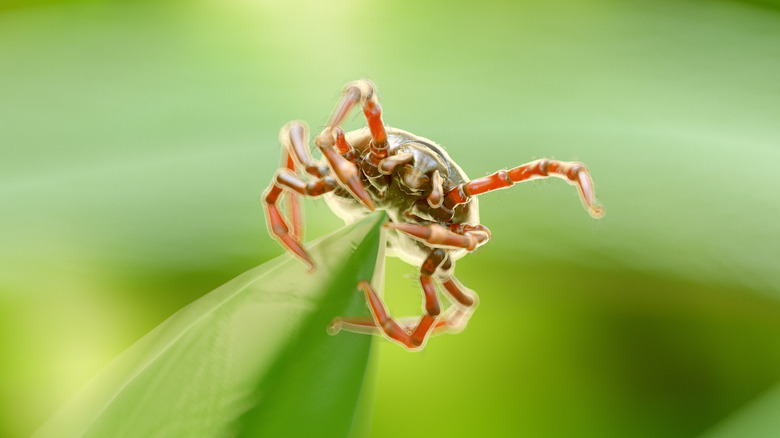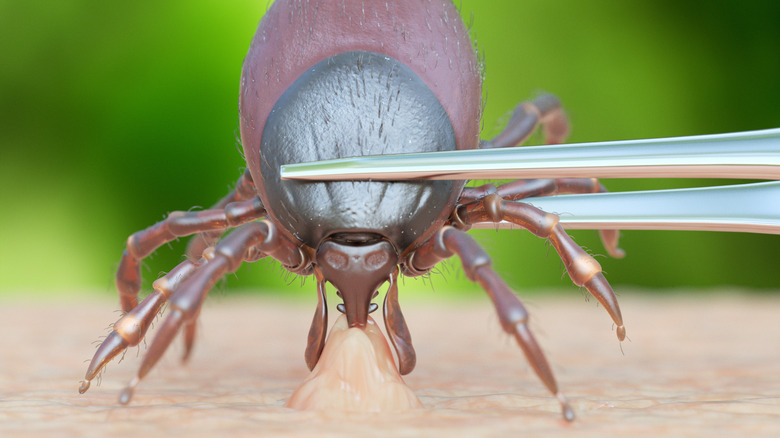Are Ticks Dangerous To Humans?
Ticks have to be some of the most widely despised creatures in existence despite their important role in the ecosystem. They are found all across the United States, hanging out in almost every place where grass grows high, waiting to grab onto unsuspecting passersby and suck their blood for sustenance. Ticks are infamous for preying on dogs and hitching a ride into our homes on the backs of our furry friends, but how much of a danger do they actually pose to a human? The answer is, quite a serious one.
Ticks have a sneaky adaptation that helps them exploit their prey. When they latch onto a host, they plunge a feeding tube through the skin to get at their blood, but they also inject some of their saliva into the host, which contains an anesthetic. This numbs the feeding area, preventing the host from even feeling that they have been bitten. This allows the tick to suck blood to its heart's content without the host attacking them back. However, that saliva can also carry a wealth of pathogens, and when they get under your skin, major problems can happen.
Tick bites usually leave a red lump on the skin, like a mosquito bite, but larger, which can cause itchiness and burning pain. That's the mildest issue though, as tick saliva can transmit Lyme disease, spotted fever, and even paralysis. Let's take a deeper dive into the worst of these threats, starting with the most notorious tick-borne illness of all.
Why Lyme disease is so dangerous
Lyme disease is notorious because it is the most commonly diagnosed tick-borne illness. The condition is caused by a bacteria called Borrelia burgdorferi, which is predominantly carried by deer ticks (Ixodes scapularis), also known as black-legged ticks. This species is found throughout the eastern United States. There is another black-legged tick species on the Pacific Coast that can also carry it. Lyme disease progresses slowly, beginning with a rash that doesn't look much different than a normal pink bite mark, but then it begins to spread. Lesions appear in other locations, and fevers and pain set in.
One of the most characteristic symptoms of Lyme disease is arthritic joint pain. In fact, Lyme disease wasn't even identified until 1975, partly because it could be misdiagnosed as rheumatoid arthritis. It was only after a suspiciously high number of children were diagnosed with arthritis in the town of Lyme, Connecticut that doctors realized a different disease was the culprit. Episodes of joint swelling can arise on and off for months or even years after contracting the condition.
Lyme disease is rarely fatal, but serious cases can cause extensive nerve damage in muscles and organs. It can cause Bell's palsy, which is paralysis of the facial muscles, and when nerves in the brain become inflamed, they can impair hearing and vision. In some cases, it can even disrupt the electrical system of the heart. Fortunately, Lyme disease can be treated with antibiotics, but seeking urgent care is essential to avoid long-term symptoms.
Other tick-borne diseases
Lyme disease is far from the only danger that ticks pose to humans. Different species of ticks carry different pathogens, so the risks vary depending on the kind of ticks in your environment. In the United States, people must be especially cautious of spotted fever, various forms of which are carried by tick species across the country. The most common of these is Rocky Mountain spotted fever (RMSF). This condition is carried by a few different tick species, including the brown dog tick (Rhipicephalus sanguineus), which is the most widespread tick in the world. RMSF is caused by the Rickettsia rickettsii bacteria, and causes similar symptoms to Lyme disease, including rash, fever, muscle pain, brain fog, and numbness. Fortunately, RMSF can also be treated with antibiotics.
The most terrifying tick-borne danger is tick toxicosis, or tick paralysis. This progressive loss of muscle function is caused by a neurotoxin in the saliva of more than 40 known tick species, although only females carry it. Paralysis begins with weakness in the limbs, which progresses over hours or a few days until a person can no longer move their arms or legs. Paralysis can become deadly when it spreads to the lungs, and 10% of tick paralysis cases prove fatal (via the CDPH). The symptoms of tick paralysis can sometimes be mistaken for Guillain-Barré syndrome. To save the patient, the tick must be removed from the body to stop the flow of neurotoxin, and some patients may need a breathing tube while they recover.
Keeping yourself safe from ticks
The best way to approach any disease is with preventative measures, but there are no vaccines to protect against tick-borne conditions like Lyme disease and Rocky Mountain spotted fever. Therefore, the necessary course of action is preventing any ticks from biting you in the first place. You can do this by wearing long pants and socks when you walk through grassy areas, applying insect repellent when you go out, and checking your whole body for ticks as soon as you return home from outdoor activities.
You must also be wary of tick eggs, which females lay in the thousands during the spring and summer seasons. Unlike most other animals, ticks don't lay eggs in nests, but rather dump them wherever is most convenient. Fortunately ticks don't lay eggs on humans, but they can lay eggs in homes, garages, and garden sheds. If ticks are a persistent problem on your property, you can use an insecticide, and some farms even keep chickens and other animals that eat ticks for a natural defense system.
If a tick does bite you, it could stay locked onto your skin for as long as 12 days. The sooner you get it off, the better. You can safely remove a tick using a pair of tweezers, gripping the bug close to your skin and pulling up slowly. Once the tick is out, keep watch for rashes, and if you feel any ill symptoms, play it safe and see a doctor.



